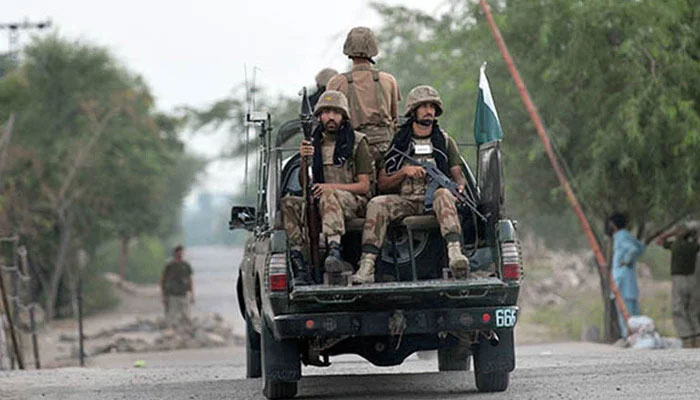An intricate balance
As Pakistan braces itself for the upcoming general elections, the specter of terrorism casts a long and ominous shadow over the democratic process. Caretaker Interior Minister Sarfraz Bugti said recently that JUI-F chief Maulana Fazlur Rehman faces a security threat. It may be recalled that in May, Jamaat-e-Islami chief Sirajul Haq had narrowly escaped a suicide attack while there are persistent threats to the JUI-F chief as well.
Bugti has said that the government will spare no effort to ensure a peaceful atmosphere during the general elections and electioneering countrywide but has also pointed out that political leaders are not ready to limit their public rallies because of the upcoming elections. Bugti has given examples of political leaders who were targeted during election campaigns in the past – and there are many such examples, to be sure. There is no denying that terrorism has made a way back in the country after years of calm, an inevitable result of the fall of Kabul and a consequence of the support the Afghan Taliban regime provides to the TTP.
This acknowledgment of security threats is not to be taken lightly, especially in a country that has endured the ebb and flow of terrorism over the years. The fall of Kabul and the support provided by the Afghan Taliban to the TTP has reignited the flames of instability within Pakistan’s borders. The implications of this resurgence are deeply intertwined with the upcoming elections, posing a formidable challenge for the government. Some political parties and their leaders are however alleging that the state may be overplaying the security threat issue to stop them from campaigning and mobilizing their voters. While these political leaders express concerns about the state possibly exaggerating security threats to curtail campaigning, the grim reality of terrorist attacks across the nation cannot be ignored. The delicate balance between ensuring a secure environment for political activities and preserving the democratic right to campaign openly becomes increasingly challenging. Political parties may have their reasons for being sceptical of the entire electoral run-up but this is not a small matter. The security concern is a real one and these warnings by the state should be taken seriously. That said, the state itself should also provide security and ensure a free and fair election. No one has forgotten how the late Benazir Bhutto was not provided any security by the state, resulting in a terrorist attack that killed her. It is the government’s responsibility to provide security to our political leaders so that they can campaign without any fear. The PPP and ANP were unable to campaign in Khyber Pakhtunkhwa in previous elections due to TTP threats; and most of the ANP leadership was assassinated by the Taliban over the years.
It is of utmost importance that terrorism is curbed and no political party or leader is targeted. Already these elections have become controversial due to the state’s response to the PTI after May 9 and the lack of political participation and activities accorded to the PTI. If any terrorist activity targets any party or leader, it will lead to further political uncertainty in a country that is facing one after another turmoil. The upcoming elections should be a testament to Pakistan’s resilience and commitment to upholding democratic values, even in the face of formidable security threats. In this critical juncture, the nation stands at a crossroads, and the choices made will undoubtedly shape its democratic destiny for years to come. Beyond the immediate security concerns during the election period, a broader perspective must be adopted to address the root causes of instability. Socioeconomic disparities, political disenchantment, and ethnic tensions often contribute to an environment conducive to unrest. Long-term stability requires a holistic approach that includes efforts to address these underlying issues, fostering a sense of inclusivity and national cohesion.
-
 18-month Old On Life-saving Medication Returned To ICE Detention
18-month Old On Life-saving Medication Returned To ICE Detention -
 Cardi B Says THIS About Bad Bunny's Grammy Statement
Cardi B Says THIS About Bad Bunny's Grammy Statement -
 Major Hollywood Stars Descend On 2026 Super Bowl's Exclusive Party
Major Hollywood Stars Descend On 2026 Super Bowl's Exclusive Party -
 Sarah Ferguson's Silence A 'weakness Or Strategy'
Sarah Ferguson's Silence A 'weakness Or Strategy' -
 Garrett Morris Raves About His '2 Broke Girls' Co-star Jennifer Coolidge
Garrett Morris Raves About His '2 Broke Girls' Co-star Jennifer Coolidge -
 Winter Olympics 2026: When & Where To Watch The Iconic Ice Dance ?
Winter Olympics 2026: When & Where To Watch The Iconic Ice Dance ? -
 Melissa Joan Hart Reflects On Social Challenges As A Child Actor
Melissa Joan Hart Reflects On Social Challenges As A Child Actor -
 'Gossip Girl' Star Reveals Why She'll Never Return To Acting
'Gossip Girl' Star Reveals Why She'll Never Return To Acting -
 Chicago Child, 8, Dead After 'months Of Abuse, Starvation', Two Arrested
Chicago Child, 8, Dead After 'months Of Abuse, Starvation', Two Arrested -
 Travis Kelce's True Feelings About Taylor Swift's Pal Ryan Reynolds Revealed
Travis Kelce's True Feelings About Taylor Swift's Pal Ryan Reynolds Revealed -
 Michael Keaton Recalls Working With Catherine O'Hara In 'Beetlejuice'
Michael Keaton Recalls Working With Catherine O'Hara In 'Beetlejuice' -
 King Charles, Princess Anne, Prince Edward Still Shield Andrew From Police
King Charles, Princess Anne, Prince Edward Still Shield Andrew From Police -
 Anthropic Targets OpenAI Ads With New Claude Homepage Messaging
Anthropic Targets OpenAI Ads With New Claude Homepage Messaging -
 US Set To Block Chinese Software From Smart And Connected Cars
US Set To Block Chinese Software From Smart And Connected Cars -
 Carmen Electra Says THIS Taught Her Romance
Carmen Electra Says THIS Taught Her Romance -
 Leonardo DiCaprio's Co-star Reflects On His Viral Moment At Golden Globes
Leonardo DiCaprio's Co-star Reflects On His Viral Moment At Golden Globes




